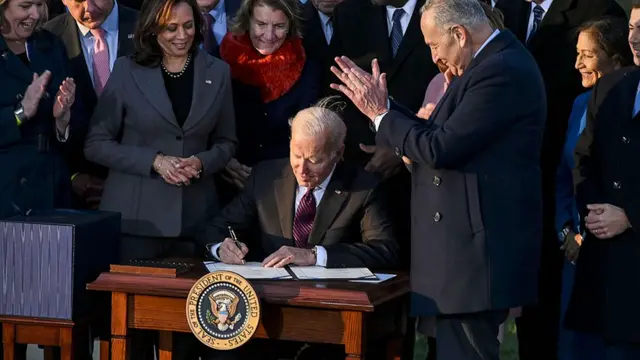A major effort to combat climate change -- reducing methane emissions -- is now underway as $1.15 billion flows to states to help close unused oil and gas wells that release pollution and greenhouse gases.
The funds stem from the Bipartisan Infrastructure Law, which in total allocated $4.7 billion over nine years for a new federal program to address orphan wells. This is the first funding phase.
There are over 130,000 orphaned wells across the country, according to a preliminary analysis from the Department of the Interior.
"This is something I have heard about from the day I became a senator. And it's got the support of counties all across the state because they see the need to clean up these leaking wells in their backyards," said Sen. Michael Bennet, D-Colo., in an interview with ABC News. Colorado is now receiving $39,006,000 to clean up the wells.
Although the terms "orphaned" and "abandoned" are often used interchangeably, a significant component distinguishes orphaned wells and makes them more difficult to find.
"There's no known owner like it's truly -- it's just out there in the wild, nobody can be attached to it," said Josh Axelrod, a senior advocate for the National Resources Defense Council.
In these instances, the lack of a known owner means the burden for cleanup ends up falling on state governments and, in turn, taxpayers. It also makes the wells more challenging to track.
While state governments and environmental groups have worked on their own to fill wells, the process can take years, with residents struggling to get wells filled in their own backyards.
The new funding focuses specifically on orphaned wells, a subset of the estimated 2 to 3 million abandoned wells in the United States that, combined, release greenhouse gases equal to 1.5 to 4 million cars annually, according to the EPA Greenhouse Gas Equivalencies Calculator.
They are the nation's tenth-largest methane emitters, according to a study conducted at McGill University, and the gas warms the planet at 80 times the rate of carbon dioxide.
Various groups are working with states to find unidentified orphaned wells through multiple processes, including using drones. The funding from the infrastructure bill only addresses already-identified wells.
There are currently 9 million Americans who live within one mile of an orphaned well, according to a study conducted by the Environmental Defense Fund and McGill University.
Tyson Price, an elementary school principal in West Virginia, worries the well in his backyard is polluting the local river and harming deer that frequently use it as a drinking source. The West Virginia Department of Environmental Protection is responsible for closing wells and maintains a list that ranks cleanup projects in order of urgency.
"Two years ago, I was 43 on the list in West Virginia. And a couple of weeks ago, I reached back out to the DEP… I'm in the 60s now; I think it was 65. So in that two-year span, I've actually moved down the list," said Price, who has spent six years trying to get the well closed.
On top of gaseous pollutants, orphaned wells can leak leftover oil and carry a risk of combusting. But the cost, technical challenges and environmental concerns prevent residents from dealing with the wells on their own. The cleanup process requires filling the wells with cement and restoring the surfaces.
"There's just no way that I could afford to plug this thing myself and do it, you know, in an environmentally safe way," Price said.
Although Tyson and his family have felt no ill effects from the well, reports have emerged of health issues brought on by proximity to unplugged wells. West Virginia is now receiving $55,293,000 from the first round of funding to help clean up the state's 6,309 orphaned wells.
The push to close the wells comes as global methane emissions have ballooned in recent years, according to new data released by the National Oceanic and Atmospheric Administration. At last year's COP26 climate summit, President Joe Biden and other world leaders announced a Global Methane Pledge to cut emissions 30% by 2030.
"It's a fundamental part of our energy transition in this country to make sure that we don't leave these orphan wells behind...I would expect there to be real momentum to do whatever is necessary to clean up the rest," Bennet said.
(ABC)
 简体中文
简体中文

